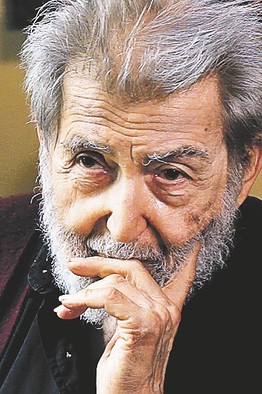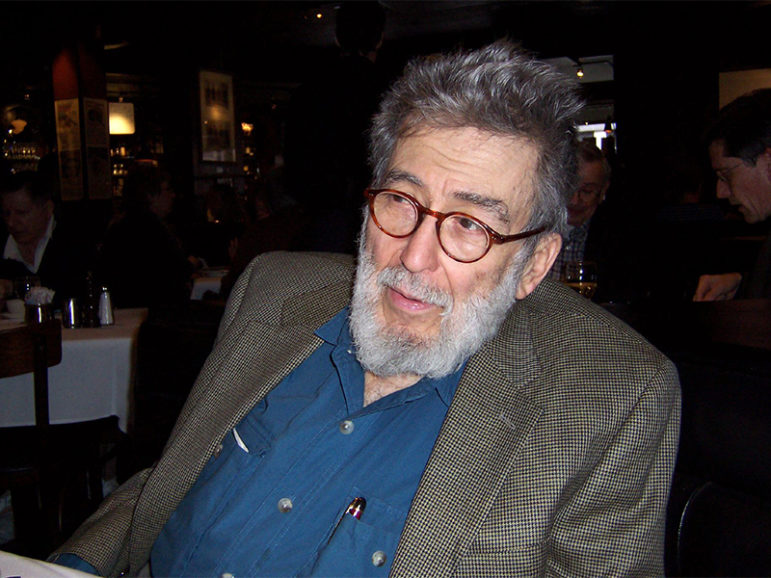Ever since I was in high school, I had wanted to be a rabbi.
And ever since I was in college, I had wanted to be a writer.
Many people influenced my desire to be a rabbi.
But only one man influenced my desire to be a writer.
That was Nat Hentoff – writer, jazz critic, and First Amendment activist – who died this weekend at the age of 91.
I first “met” Nat Hentoff through his writings in the Village Voice. I admired his spirit, how he turned his words into a roar.
And then, I met him. Nat’s daughter, Jessica (who has gone on to a great career in the circus) lived on my floor at SUNY Purchase. Hentoff came to speak at our college about the moral tasks of journalism. This was during Watergate, which was uncovered because of the investigative journalism of Woodward and Bernstein.
I was already the features editor of our college newspaper (which was edited by Adam Nagourney, who has gone on to a stellar career in journalism, and also staffed by the veteran writer Joanne Wasserman).

Nat Hentoff (1925-2017)
But, Nat Hentoff hooked me on wanting to take my passion to the next step. I would go on to write for various magazines; become Eugene Borowitz’s assistant editor on Sh’ma; write hundreds of articles and ten books (visit them here and here).
But, why does Hentoff matter – especially today?
Because, in many ways, Nat Hentoff captured all of the contradictions and nuances of living in a morally complicated time. A headline announcing his death sums it up: referring to him as “an anti-abortion atheist and free speech advocate.”
What caused Hentoff to become critical about abortion?
It was the issue of late abortion.
I started hearing about “late abortion.” The simple “fact” that the infant had been born, proponents suggest, should not get in the way of mercifully saving him or her from a life hardly worth living. At the same time, the parents are saved from the financial and emotional burden of caring for an imperfect child.
And then I heard the head of the Reproductive Freedom Rights unit of the ACLU saying : “I don’t know what all this fuss is about. Dealing with these handicapped infants is really an extension of women’s reproductive freedom rights, women’s right to control their own bodies.”
It seemed to me we were not talking about Roe v. Wade. These infants were born. And having been born, as persons under the Constitution, they were entitled to at least the same rights as people on death row – due process, equal protection of the law….infanticide would eventually become openly permissible, to be followed by euthanasia for infirm, expensive senior citizens.
Nat became convinced that, at a certain point, fetuses have rights.
Some will profoundly disagree with Hentoff — especially now that women’s right to choose is under threat. I would not want those rights to be compromised in any way.
But, just know why Hentoff changed his mind on abortion. For him, it was about rights — from which, in his judgment, a fetus is not exempt.
Yes, Nat was out of step (which became the title of the documentary on his life – “The Pleasures of Being Out of Step”. Nat knew it — and he paid a price.
There was another way that Nat Hentoff had changed.
In the late 1970s, Nat and I would sometimes see each other at various left-of-center-Israel events. He cared about Israel, and that is why I invited Nat to contribute to my book on Israel, A Dream of Zion. I expected him to write a left-leaning reflection.
Hardly.
After the intifadas and the suicide bombers, it was clear to me that Abba Eban was right: “The Palestinians never miss an opportunity to miss an opportunity,” and I finally became a strong supporter of Ariel Sharon….When I am asked to identify my religion, I answer: “The Constitution of the United States.” I do not believe in a god, but I do believe I am a Jew – and therefore, what happens to Israel happens to me.
Out of step? You bet. Precisely at the moment when many of his peers and colleagues were turning ever more resolutely left on Israel, Hentoff was moving to the right.
There is a final memory – a personal memory of a conversation with Nat that changed my life.
As I said, I first met Nat Hentoff when he came to speak at my college. We chatted after the lecture, and then wandered over to the campus bar.
“Can I buy you a beer?” he asked me.
“Wish that I could, but I can’t.”
“Why not?”
“Because it’s Pesach. Beer is chametz, so I can’t have any.”
Hentoff stroked his beard for a few seconds. “Hmnn,” he said. That was all. He was smiling.
Suddenly, it was as if this “atheist Jew” had been transported back to his Jewish boyhood. It was as if a memory had been kindled in his soul. Perhaps, at that moment, Hentoff remembered that his commitments – human dignity and human freedom – were not secular, that they flowed from the Exodus from Egypt.
I would like to think that the moment stayed with him, as it has stayed with me.
In the words of Paul Simon: “Who’ll be my role model, now that my role model’s gone?”
If you are wondering why you are reading “Martini Judaism,” ultimately – it is because of Nat Hentoff.






